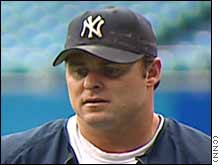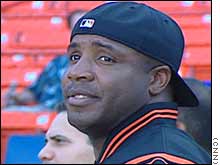 |
| Jason Giambi's steroid problems are affecting endorsement opportunities for other stars. |
|
|
|
 |
| Reports that Barry Bonds used steroids probably makes him the biggest endorsement loser as he approaches the home run record. |
|
|
|
|
|
NEW YORK (CNN/Money) - When it comes to allegations of steroid use, Jason Giambi and Barry Bonds might be on the hot seat. But other major league stars are paying the price.
The controversy surrounding stars like Giambi and Bonds, industry executives say, is making advertisers nervous about all baseball players -- even skinny guys who have never had a whiff of scandal.
"Right now there's a risk in signing any baseball player, whether or not there's been a rumor about him or not," said Jeff Chown, of managing director of the Marketing Arm, an agency that negotiates agreements between celebrities and advertisers. "There's a dark cloud over the entire sport."
Chown's firm has not negotiated a single agreement with a baseball player this offseason.
"Advertisers are normally pretty risk averse anyway," said Chown. Controversy has made them gun shy.
Giambi reportedly admitted to a grand jury in 2003 that he used steroids. He spent last season denying improper drug use, but in a Thursday afternoon press conference tacitly owned up. ("I told the truth to the grand jury," Giambi said, without adding details.)
Bonds also reportedly testified he used steroids, though he claims he didn't know what he was taking.
Then there is the book due soon from former player Jose Canseco, which implicated former teammate Mark McGwire and others. Many of those named by Canseco, including homer king McGwire, denied the allegations.
University of Delaware professor John Antil, an expert on celebrity endorsements, said that the spreading steroids problem may explain why Boston Red Sox stars haven't been seen in more commercials since they won the World Series.
"It taints the whole group," he said. "Does that mean I won't use Curt Schilling? Not necessarily. But I'll think more carefully before I do so."
Major League Baseball and the players union reached a deal on a new tougher policy to test for steroid use during this offseason, partly as a reaction to the reports out of the Bay-area grand jury. But it will take some time to convince advertisers that the plan is cleaning up the sport, Chown said.
Meanwhile, advertisers may be getting out ahead of fans' attitudes about the scandal. Baseball had record attendance and strong viewership numbers last season, even as the scandal developed. The Olympics also posted strong ratings last summer, despite their own drug scandals.
Past controversies in other sports have generally only tarnished the athletes who are proven guilty, not other competitors, according to Henry Schafer, executive vice president of Marketing Evaluations Inc., the firm that issues "Q scores" measuring public attitudes about celebrities.
"It does not tend to affect the (fans') perceptions of other players," Schafer said.
He does say, however, "it's likely to affect advertisers' perceptions. They might want to give it some time to shake out."
The biggest endorsement loser is probably not an innocent victim. Barry Bonds is likely to pass Babe Ruth's home run total this season, and could make a run at Henry Aaron's career record by the end of 2005 or early 2006.
But advertisers are not rushing to use a player who is sure to get huge attention in the coming months, because much of the attention will focus on allegations that he used steroids while running up his home run total.
Bonds needed to be free of any controversy to attract advertisers because he was already a polarizing figure with relatively high negative views by many fans.
"If he didn't have this issue hanging over him, he'd be in much greater demand, even with his prickly reputation," said Chown. "He's always had that prickly reputation and it didn't stop us from signing him for two brands in the past."
Of course, the athletes losing the endorsement dollars are all well paid by their teams, and in no need of public assistance, or even sympathy. But it does suggest one more motivation for the game's leading players to try to make sure the sport does rid itself of the stench of steroids.
"I think the players realized that (advertiser reluctance)," Chown said. "That's one of reasons they agreed to the stiffer policy," Chown said.

|